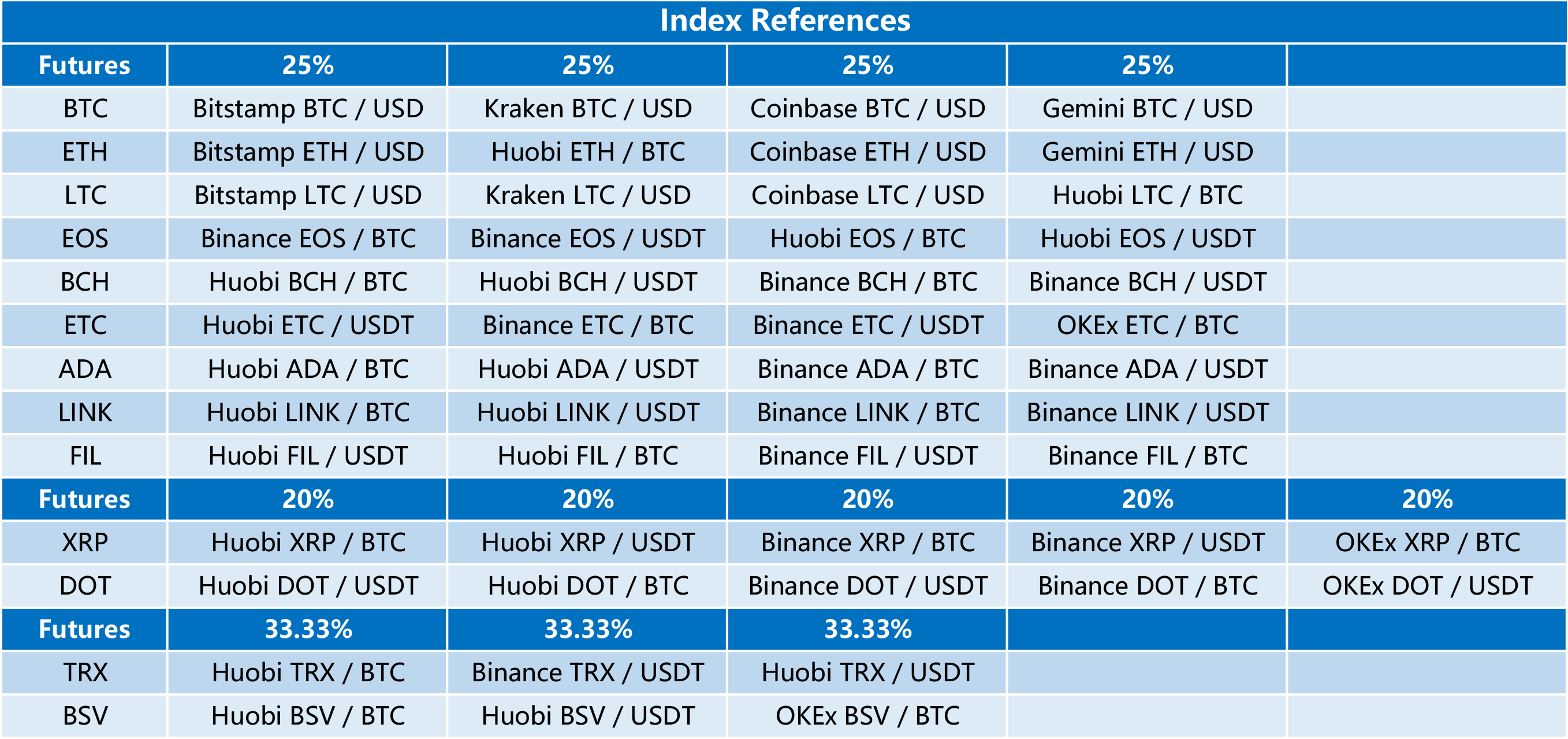Indexes computation rules
Huobi Futures Index Price Data retrieval: The average of the major exchanges’ latest prices.
For each type of contract, there is an index. For example, BTC contracts use the BTC index price. Contracts of the same variety with different expiring dates use the same index, for example, BTC weekly, bi-weekly, quarterly and bi-quartely contracts all use the BTC index price.

【The above data and indicator contents may be adjusted in real time according to market conditions, and the adjustments will be made without further notice.】
Data retrieval: the latest prices of the major exchanges are retrieved through API every 1 seconds.
Accounting currency: Within the indexes, if the accounting currency of the exchanges is different from the transaction pair accounting currency, it will be displayed in index accounting currency after the conversion based on exchange rates.

For example: EOS index samples are taken from the latest prices of EOS/BTC of three exchanges, the conversion process is:
- EOS/USD Price = EOS/BTC latest price * Huobi futures BTC/USD index price;
- EOS/USDT Price = EOS/USDT latest price * Huobi futures USDT / USD index price;
- Take four EOS/USDT price is weighted and averaged, and the EOS index price is calculated.
How to handle abnormal situations:
- The price of a single exchange deviates greatly from other exchanges
Solution:
1.If there are more than 2 valid exchanges within the indices, when the price of a certain exchange deviates more than ±3% from the median price of all exchanges (including the above), fot such exchange, its price will be calculated as ±3% of the median price of all exchanges (including the above):
For example: Let's say the BTC price of X exchange is 518 USD, and the prices of other exchanges are 500, 501, 502, 503, 504 (USD).
The median price of all exchanges (including the above) is 502.5, so the price of X exchange deviates from others by (518-502.5)/502.5=3.08%, which is more than 3%.
Instead of 518 USD, system will take 502.5*(1+3%) =517.57 as X exchange's price.
Therefore, the final index will be (517.57+500+501+502+503+504)/6=504.59 USD
2.If there are only 2 valid exchanges within the index (only 2 exchanges within the index: the temporary removal of some exchanges due to the loss of the market). If the price difference between two platforms is greater than 25%, then the price of the exchange, which has a smaller deviation from the previous calculated index price, is considered normal, while the other exchange is considered to have an Fat Finger index. In this situation, the index price is temporarily anchored at the price of the exchange considered normal.
- Data loss of a single exchange
Solution
If the valid data available from a single exchange not retrievable for a certain period (due to exchange closed, market suspended, attacked or other reasons), then the price at that point will be calculated according to the latest efficient price obtained.
If the valid data obtained by an exchange from the previous 100 data points (10 min) is less than 10%, it will be considered that this exchange’s price lose its guiding significance, and the weight of this exchange will be temporarily adjusted to zero. When the data of this exchange recovered, and there are at least 90 efficient data points out of 100 (90%), then the weight of this exchange will be recovered.
- Large price deviation of a single exchange
Solution:
When the price of an exchange has deviated significantly from that of other exchanges for a long period of time, it is considered that the index of this exchange may lose guiding significance, and the index samples and the weight will be adjusted.
Exchange Rate Rules
Huobi Futures adopted the average 7-day OTC exchange rate as the latest exchange rate.
Latest average exchange rate = the last 7 days average exchange rate[(data retrieve once a day at 16:00 pm (GMT+8)]
Exchange rate change occurs at 16:00 pm (GMT+8) every Friday after the delivery. That is, before delivery of contracts every week, the same exchange rate is used, so as to prevent the influence of the exchange rate fluctuation on users’ operations. The exchange rate updated after delivery is the average exchange rates obtained from last Saturday to this Friday, every 16:00 (GMT+8).